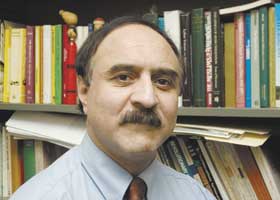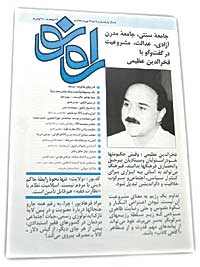  |
| HOME | THIS ISSUE | CALENDAR | PATENTS | BACK ISSUES | < BACK | NEXT > |
History professor traces 100-year quest for democracy in Iranby Scott Brinckerhoff - April 24, 2006 |
|||||
|
Born in Iran and educated in the UK, Fakhreddin Azimi is a recognized authority on the history of modern Iran. One of his key areas of research is the 100-year-long quest for democratic rule in the country of his birth. Azimi, an associate professor of history, acknowledges that “democracy” and “Iran” may not often be linked in the minds of evening television news viewers, but, he says, democratic institutions and aspirations have been part of the Iranian political landscape since 1906. With Iran in the headlines these days, Azimi is sometimes reluctantly pulled from his historical studies into contemporary events.
When this happens in class, he encourages students to view today’s events through the prism of history, taking into account 100 years of seesawing between parliamentary and authoritarian rule. In an interview in his Wood Hall office – decorated with an old map of Iran, a poster of the tomb of a Sufi mystic, and one depicting typical Iranian cuisine – the soft-spoken Azimi recalled events that shaped his country’s history. It’s an account sprinkled with references to oil, imperialism, and the CIA, which had a hand in keeping Iran’s monarchy – headed by Shah Mohammad Reza Pahlavi – in power until the ayatollah-led revolution of 1979. Oil has played a crucial role in Iran’s relations with the West since the early 1900s; at various times in the past century, Britain, the United States, and Russia each held considerable sway over Iranian governments, while Britain controlled the oil industry. Azimi, who was educated at the universities of Tehran, London, and Oxford, has been at UConn since 1991. He teaches courses on the Middle East in both medieval and modern times, as well as a graduate seminar that explores the relationship between history and the social sciences. He has conducted extensive research in archives in Iran, Britain, and the U.S, and has just completed a manuscript on the history of governance in Iran and the ebb and flow of democratic institutions and practices since the Constitutional Revolution of 1906. He has conducted a detailed study of the political career of Mohammed Mosaddeq, the democratically elected prime minister of Iran who replaced the Shah and led the movement for the nationalization of the British-controlled oil industry. Mosaddeq was ousted in 1953 in a coup d’état organized by the CIA and Britain’s MI6.
The British and Americans used Cold War fear-mongering to mold Iranian politics to their liking, Azimi found in the course of his research. By comparing what the various players in the drama were saying in official documents – now unsealed – against what was being reported publicly, Azimi has shown that a “communist threat in Iran” was fabricated as a ruse for removing Mosaddeq and enabling the Shah to establish dictatorial rule in Iran for more than a quarter of a century. “We’ve seen this sort of thing throughout history, where public perceptions are belied by official documents,” Azimi says. “But until scholars or journalists make the effort to go back through the documents, the truth can be elusive.” Azimi believes there are good reasons to be optimistic about the future of Iran, in large part because of young people. “The younger generation will not indefinitely tolerate being ruled by aging ayatollahs,” he says. “Modernity has spread, young people follow international trends, and they have a spirit that cannot be suppressed. But Iranians are strongly nationalistic, so any kind of military action against the country would do irreparable damage to the democratic process.” To illustrate that Islam cannot be viewed as determining every facet of Iranian life, Azimi cites a festival called No Ruz, which dates back to the pre-Islamic era of Iran’s long history. “There was an effort to curtail No Ruz, but it proved impossible,” he says. “The festival, which celebrates the birth of spring, is rooted in Iranian cultural identity and it overshadows anything religious. For Iranians, it’s a moment of renewal, a 14-day period when people visit friends, take vacation, and exchange gifts.” Today, power in Iran is exercised by a president and a parliament, and a “supreme (religious) leader,” whose authority extends over government institutions, as well as the military and intelligence forces. Still, many of the structures of Iran’s government have counterparts in the United States, including the three branches of government, and Azimi notes that much of the internal debate in Iran over the past 100 years touches on individual rights and other issues that were debated during the American Revolution. Azimi says the Turkish model of government demonstrates that a democratic and Islamic society can coexist and enjoy good relations with the West. “The record in Turkey isn’t perfect,” he says, “but the consolidation of democratic institutions and the government’s desire to join the European Union have contributed to considerable improvements in human rights.” |
| ADVANCE HOME UCONN HOME |


